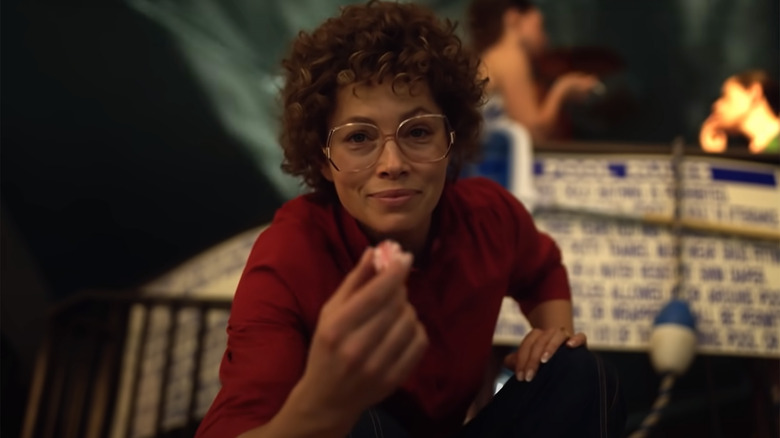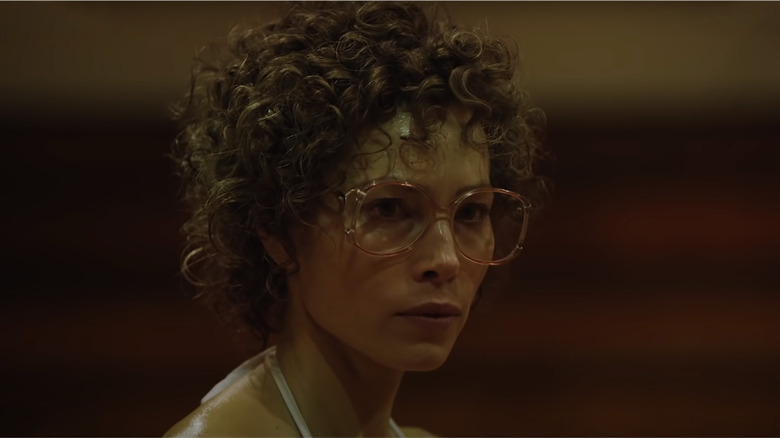Candy Review: A Salacious Story Of Sex And Murder In 1980s Suburbia
True crime adaptations have the tricky task of maintaining tension and drama while knowing that at least some of the viewers already know how it all shakes out. The facts and details have to be presented in a way that appeals to true crime fanatics while also keeping your average viewer hooked. It's not easy, and while "The Act" mostly managed to keep the tension at a fever pitch throughout, "Candy" struggles a bit with pacing and doling out those details. One thing is for certain: "Candy" is some next-level feel-bad television.
The story of Candy Montgomery, a suburban housewife in Wiley, Texas in the 1980s, is almost too wild to be believed. It's really no surprise that both Hulu and HBO Max have both decided to give the true crime tale the dramatic miniseries treatment — because it's got everything: a brutal ax murder, a torrid affair, and one of the most mind-boggling trials in history. Both miniseries are based on the book "Evidence of Love: A True Story of Passion and Death in the Suburbs" by authors Jim Atkinson and John Bloom (better known to some as horror host Joe Bob Briggs), which expanded upon the information they presented in their two-part article for Texas Monthly, "Love and Death in Silicon Prairie."
"Candy" is showrun by Emmy-nominated writer Robin Veith who also co-created the series with Nick Antosca, who earned attention for the Hulu series "The Act," based on the true-crime documentary "Mommy Dead and Dearest." Jessica Biel stars as Candy Montgomery: wife, mother of two, and ax murderer who killed her former lover's wife. She's nearly unrecognizable with a curly pouf of hair and big, wire-framed glasses, and she brings a needed intensity to the role. Also starring: the always-incredible Melanie Lynskey as Candy's victim and neighbor Betty Gore, Timothy Simons as Candy's husband Pat, Pablo Schreiber as Betty's husband and Candy's lover Allan Gore, and Raúl Esparza as Candy's attorney, Don Crowder. While the case was somewhat high-profile in the early 1980s, many viewers likely won't know the full events or the outcome of the story, and in this instance, the less you know, the better.
The limited series spends quite a bit of its five-episode runtime trying to give the viewer insight into the troubles both Candy and Betty were going through. The first episode, in particular, is deeply sympathetic to both women, who clearly feel trapped by their places as mothers and wives. Betty begs her husband not to go on another work trip, leaving her pregnant and scared, while Candy has her hands full with her own two school-age children and a husband who ignores her. We see Candy making breakfast for her kids along with Betty's daughter, who is best friends with Candy's daughter. Even as Candy agrees to take Betty's daughter to see "The Empire Strikes Back" with the family, she mentions to her husband that the only time the girl has fun is with them. It's the first of many tiny seeds of loathing Candy has for Betty that's revealed to the audience, though it is only a small portent of what's to come.
When a suburban housewife snaps
Biel's performance will likely garner the most attention, and for good reason: she's terrifying here. She plays Candy as cold and calculating, but excellent at hiding her true nature behind a veneer of Sunday school sweetness. The best parts of her performance come in the small moments, when she's finally out of eyesight and her face subtly shifts. Her coldness doesn't mean she's unfeeling, however, and Biel imbues Candy with both desperate longing and bone-weary exhaustion. When she finally decides that she wants to cheat on her husband, she arranges meetings with her potential lover, Betty's husband Allan, whom she met in church. The two list the pros and cons of having an affair and eventually neatly schedule their rendezvous, in what is possibly the least sexy foreplay ever. When they get to the hotel, however, the passion starts to become clear. Schrieber is a perfect fit for Allan, because he's attractive enough to at least see part of Candy's reasoning, and he manages to be charming even when he's being a total scumbag. Lynskey is excellent as Betty, though her role is the one that gets the shortest shrift. There are attempts at injecting some of her voice back into the story after the murder takes place, but they are few and far between, and end up feeling like a half-measure.
"Candy" is a horror story, though it trades in shocks and gore for slow, creeping dread. Every moment with Candy and Betty truly feels like the precursor to something terrible, even when Candy does something nice, like throw Betty a baby shower. The series lingers in the most awkward and uncomfortable moments, presenting the viewer with situations too nightmarish to contend with. It's as if the camera is pointing at each of the people involved and asking them how they live with themselves, because everyone is so deeply troubled. There's a touch of Gillian Flynn's work, like "Gone Girl" or "Sharp Objects" here, examining how the patriarchy can lead to women lashing out in terrifying ways, but it thankfully never tries to make Candy an antihero.
The biggest problem with "Candy" is the pacing. The series creeps its way through the events leading up to the murder, then spends a bit of time in the immediate aftermath and investigation. The murder itself is (thankfully) only briefly shown, though there are a few graphic shots of deep wounds. Once Candy is on trial, the series speeds up tremendously, rushing through the legal proceedings before delivering the verdict and fading to black. While such an ending is somewhat powerful, that power is lessened by the way the final episode rushes through everything. Even the investigation could have been better portrayed, because the facts are too fascinating to leave out. For example, Wiley is such a small, peaceful town that the police used packing tape to block the crime scene because they didn't really have a need to have crime scene tape on hand. The inexperienced police officers caused major problems for the investigation, including moving evidence (which is at least depicted) and trying to use plastic sandwich bags to cover the ax handle to protect any fingerprints. The murder had an impact on an entire community, and Candy's lawyer died by suicide years later, in part because he felt guilty for defending her. Spending time languidly turning up the tension for four episodes only to rush through it all and then announce "the end" unfortunately doesn't make for compelling television.
True crime fans are sure to find things to appreciate in the series, and fans of cinematic storytelling will appreciate the good cinematography and great performances, but in the end, "Candy" is a little bit of a mess. Is it a social horror about feeling trapped by gender roles? Is it a morality tale about the dangers of extramarital sex? Is it a basic horror story about the woman next door who snaps and hits her friend with an ax 41 times? It's all of these to some degree, but it never commits to any one thing fully enough to feel satisfying.
/Film Rating: 6 out of 10
"Candy" premieres May 9, 2022 on Hulu.

